小学语法一般将来时【精选】
小学英语重点语法般将来时

小学英语重点语法:般将来时“一般将来时”的几种语法形式一般将来时的语法形式主要有四种:shall / will +动词原形;be going to +动词原形;现在进行时和一般现在时。
现将这四种形式分述如下:一、shall / will +动词原形1. will可用于所有人称,但shall 仅表示单纯将来时,用于第一人称I和we,作为will的一种替代形式。
以You and I为主语时通常避免用shall。
例如:He will be back soon. 他很快就会回来。
I shall/will be free on Sunday. 星期天我有空。
You and I will work in the same factory. 你和我将在同一工厂工作。
2. will, shall可用来预言将来发生的事。
如说出我们设想会发生的事,或者请对方预言将要发生什么事。
例如:It will rain tomorrow. 明天将要下雨。
3. will, shall除可表示单纯的将来时以外,还可以带有意愿的色彩,仍指的是将来。
例如:I’ll buy you a bicycle for y our birthday. 你过生日时,我给你买一辆自行车。
(表示允诺)Will you open the door for me please? 请你帮我开门好吗?(表示请求)Shall I get your coat for you? 我可以为你拿外套吗?(表示提议)二、be going to +动词原形1. 表示说话人根据现在已有的迹象,判断将要或即将发生某种情况。
这类句子的主语可以是人,也可是物。
例如:There is going to be a football match in our school tomorrow afternoon. 明天下午我们学校将有一场足球赛。
(已有告示)I feel terrible. I think I’m going to die. 我感到难受极了,我想我快不行了。
小学英语03一般将来时

什么是一般将来时?一般将来时表示将来某一时刻的动作或状态,或将来某段时间内经常的动作或状态。
常用的基本形式有三种:will/shall结构;be going to结构;be about to结构一.will/shall 结构1.基本结构:主语+will/shall+ 动词原形表示将来发生的事情或是主语将要发生的行为,也用于征求对方的意见或表示客气的邀请。
It will be sunny tomorrow.明天将是个好天气。
(表示将来发生的状况)I will come back soon.我很快就回来。
(表示主语将要发生的行为)Will you please open the window?请你把窗打开,好吗?(表示征求对方的意见)小提醒★一般将来时任何主语都可以用will但书面语中第一人称常用shall。
I shall study harder at English.我将更加努力地学习英语。
Shall we go to see a film?我们去看电影好吗?★will,shall和主语都可以缩写成’llI’ll fly to London.我要坐飞机去伦敦。
They’ll visit the museum tomorrow.他们明天要参观博物馆。
2. 一般疑问句:将will/shall提到句首Will you go there?你要去那儿吗?3.否定句:在will/shall后加not,可缩写成won't/shan't陈述句:I will go there./I shall go there.我要去那儿。
否定句:I won't go there. /I shan't go there.我不去那儿。
4. 特殊疑问句:特殊疑问词+ will/shall +主语+动词原形+其他?What will he do this evening?今晚他准备做什么?(针对动词提问)When will you visit him?你什么时候去拜访他?(针对时间提问)Where will they have a running race?他们准备在哪里赛跑?(针对地点提问)二.be going to结构be going to表示主观的打算或计划,一般指近期或事先考虑过的将要发生的动作以及已有迹象表明必将发生某事,意为“打算,就要”。
小学六年级英语一般将来时四个句型
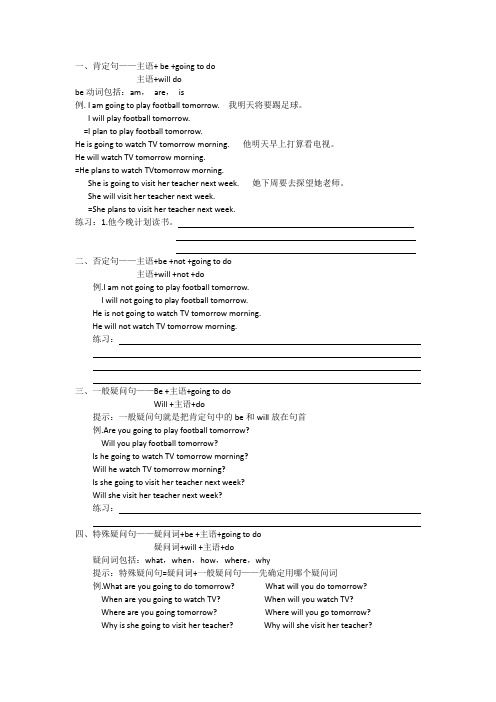
一、肯定句——主语+ be +going to do主语+will dobe动词包括:am,are,is例. I am going to play football tomorrow. 我明天将要踢足球。
I will play football tomorrow.=I plan to play football tomorrow.He is going to watch TV tomorrow morning. 他明天早上打算看电视。
He will watch TV tomorrow morning.=He plans to watch TVtomorrow morning.She is going to visit her teacher next week. 她下周要去探望她老师。
She will visit her teacher next week.=She plans to visit her teacher next week.练习:1.他今晚计划读书。
二、否定句——主语+be +not +going to do主语+will +not +do例.I am not going to play football tomorrow.I will not going to play football tomorrow.He is not going to watch TV tomorrow morning.He will not watch TV tomorrow morning.练习:三、一般疑问句——Be +主语+going to doWill +主语+do提示:一般疑问句就是把肯定句中的be和will放在句首例.Are you going to play football tomorrow?Will you play football tomorrow?Is he going to watch TV tomorrow morning?Will he watch TV tomorrow morning?Is she going to visit her teacher next week?Will she visit her teacher next week?练习:四、特殊疑问句——疑问词+be +主语+going to do疑问词+will +主语+do疑问词包括:what,when,how,where,why提示:特殊疑问句=疑问词+一般疑问句——先确定用哪个疑问词例.What are you going to do tomorrow? What will you do tomorrow?When are you going to watch TV? When will you watch TV?Where are you going tomorrow? Where will you go tomorrow?Why is she going to visit her teacher? Why will she visit her teacher?。
小学语法一般将来时

用will构成的将来时,所表示的动作与人的主观愿望无关。 I will graduate from this school soon. You will stay alone after I leave.
一般将来时
用法
shall和will在口语的一些疑问句中相当于情态动词。Shall一般与第一人称连用,will多与第二人称连用。 Shall we go to the zoo next Saturday? Will you please open the box for me?
一般将来时
一般将来时
否定句 主语+be(am/is/are ) not going to+动词原形+… She isn’t going to see a movie. I am not going to watch TV.
Be(Am/Is/Are )+主语+going to+动词原形+…?
Yes, they are. / No, they aren’t.
一般将来时
01
02
03
CONTENTS
一般将来时
01
Hale Waihona Puke 02表示将要发生的动作或打算、计划,
准备做某事。
一般将来时
主语+be(am/is/are ) going to+动词原形+…
主语+will+动词原形+…
结构:
一般将来时
一般将来时
肯定句 主语+be(am/is/are ) going to+动词原形+… They are going to have a trip. He is going to make a plane model. I am going to get up early.
小学英语语法时态一般将来时详解
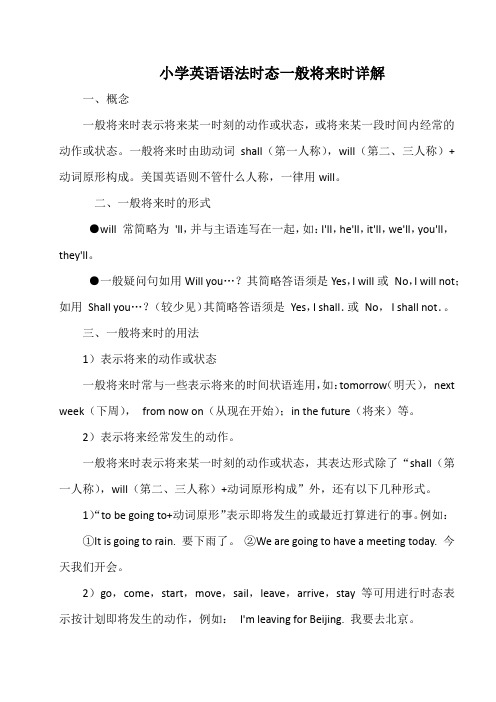
小学英语语法时态一般将来时详解一、概念一般将来时表示将来某一时刻的动作或状态,或将来某一段时间内经常的动作或状态。
一般将来时由助动词shall(第一人称),will(第二、三人称)+动词原形构成。
美国英语则不管什么人称,一律用will。
二、一般将来时的形式●will 常简略为'll,并与主语连写在一起,如:I'll,he'll,it'll,we'll,you'll,they'll。
●一般疑问句如用Will you…?其简略答语须是Yes,I will或No,I will not;如用Shall you…?(较少见)其简略答语须是Yes,I shall.或No,I shall not.。
三、一般将来时的用法1)表示将来的动作或状态一般将来时常与一些表示将来的时间状语连用,如:tomorrow(明天),next week(下周),from now on(从现在开始);in the future(将来)等。
2)表示将来经常发生的动作。
一般将来时表示将来某一时刻的动作或状态,其表达形式除了“shall(第一人称),will(第二、三人称)+动词原形构成”外,还有以下几种形式。
1)“to be going to+动词原形”表示即将发生的或最近打算进行的事。
例如:①It is going to rain. 要下雨了。
②We are going to have a meeting today. 今天我们开会。
2)go,come,start,move,sail,leave,arrive,stay等可用进行时态表示按计划即将发生的动作,例如:I'm leaving for Beijing. 我要去北京。
3)“be to+动词原形”表示按计划要发生的事或征求对方意见。
例如:①Are we to go on with this work?我们继续干吗?②The boy is to go to school tomorrow.这个男孩明天要去上学。
小学英语一般将来时

汇报日期
What is Xi Yangyang going to do?
He is going to wash the clothes.
What is Lan Yangyang going to do?
He is going to swim.
单击此处添加正文,文字是您思想的提炼, 请尽量言简意赅的阐述观点。
B
B
B
( ) 4. There ________ a kite show in the zoo tomorrow evening. A. was B. is going to have C. will have D. is going to be
will eat
will eat
will play
will jump
will fly kites
be going to+动词原形 = will +动词原形
c
D
A
一、单项选择。 ( ) 1. There __________ a meeting tomorrow afternoon. A. will be going to B. will going to be C. is going to be D. will go to be ( ) 2. Charlie ________ here next month. A. isn’t working B. doesn’t working C. isn’t going to working D. won’t work ( ) 3. He ____ go to Zhaoqing this week. A. will B. is D. is going
否定形式:把be动词或will后面加nቤተ መጻሕፍቲ ባይዱt 例如:Jim is not going to play football. Jim will not play football. 一般疑问句:把be动词或will调到句首, 例如:Is Jim going to play football? Will Jim play football?
小学英语语法课件-一般将来时(全国通用版)

3.There be 句型的将来时
There is going to be a football match next week. =There will be a football match next week.
Part 实践出真知
1.Jack is going to buy a present this evening.(改为一般疑问句)
3.Lisa goes to school. (用in the future改写句子)
__L__is__a__w_i_l_l _g_o__t_o__s__c_h_o__o_l_i_n__t_h_e__f_u_t_u_r_e__. _______________
4.Taylor is going to make a cake.(改为否定句)
将
in + 一段时间 ,soon
来
时
句式
句型转化
1.肯定句 主语 + am/is /are + going Nhomakorabeato do
They are going to see a film tonight.
2.否定句 主语 + am/is /are + not + going to do
They aren't going to see a film tonight.
__I_s__J_a__c_k__g__o_i_n_g__t_o__b__u_y__a__p_r_e_s__e_n_t__th__i_s_e__v_e_n__in__g_?_____
2.They will have a birthday party tomorrow. (变成否定句)
小学一般将来时讲解

小学一般将来时讲解1. 介绍小学一般将来时是英语语法中的一种时态,用来表示将来发生的行动或事件。
在这种时态中,动作与时间的关系是相对的,即动作将在将来某一时刻发生。
2. 构成小学一般将来时由情态动词 "will" 或 "shall" 加上动词原形构成。
下面是一些例子:- I will go to school.- She will play basketball.- We shall see a movie.3. 肯定句结构小学一般将来时的肯定句结构是:主语 + will/shall + 动词原形+ 其他。
4. 否定句结构小学一般将来时的否定句结构是:主语 + will/shall + not + 动词原形 + 其他。
5. 疑问句结构小学一般将来时的疑问句结构是:Will/Shall + 主语 + 动词原形+ 其他?6. 使用场景小学一般将来时常用于以下场景:- 表示未来的计划或打算:I will go to the park tomorrow.- 表示预测:It will rain later.- 表示意愿或请求:Will you help me with my homework?7. 注意事项在小学一般将来时中,我们要注意以下几点:- 不使用"will"或"shall"来表达对他人的承诺或决定,如"I promise"或"I decide"。
- 在口语中,经常使用"will"而不是"shall"。
- 在第一人称疑问句中,我们可以使用"shall"代替"will",但这并不常见。
希望这份文档对你的小学一般将来时的学习有所帮助!。
小学五年级下册英语重点语法:一般将来时

◆ 一般疑问句:Be动词 + 主语 + going to+动原+其它?
如:Are they going to have an English test nexபைடு நூலகம் week?
他们下周有英语考试吗?
◆ 特殊疑问句:
特殊疑问词+ be动词 + 主语 +going to+动原+其它?
★一般将来时态的定义:
表示将要发生的动作或存在的状态。
如: I will see a film tomorrow.
我明天将去看一场电影。
He will be 10 years old next year.
明年他就十岁了。
★一般将来时态的标志词:
1、tonight(今晚)
2、soon(不久;很快)
3、tomorrow系列:tomorrow morning/afternoon/evening
the day after tomorrow(后天)
4、next系列:next week/ next year/ next Monday...
5、一段时间+later系列:five years later/ three days later…
6、in + 一段时间系列:in five minutes/in two weeks…
如:They are going to have an English test next week.
他们下周有一场英语考试。
◆ 否定句:主语 + be动词+ not +going to+动原+其它.
如:They aren't going to have an English test next week
小学英语语法课件- 一般将来时 (共36张PPT) 全国通用
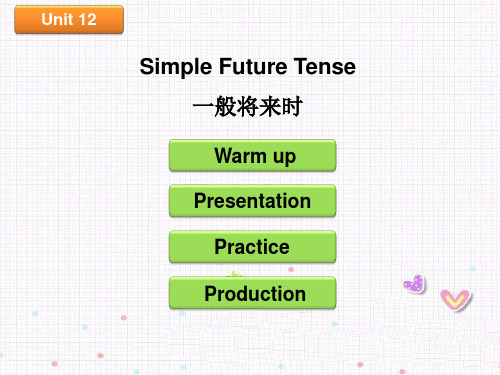
Presentation Sentences
She will take swimming lessons in this vacation. 她今年假期要去学游泳。 She is going to go shopping tomorrow. 她明天要去购物。 Jim will open a shop on internet. 吉姆打算要在网络上开个店。 Jim is going to be an actor when he grows up. Jim长大了想当一名演员。
___t_o_m_o_r_ro_w_.____________________________ 一般疑问句:A__re_t_h_e_c_h_il_d_re_n_g_o_i_ng__to__w_a_tc_h_a_d_o_l_p_h_in_s_h_o_w__
t_o_m_o_r_ro_w_?____________________________ There will be a great concert next week. 否定句:_T_h_e_r_e_w_il_l _n_o_t b_e__a_g_re_a_t_c_o_n_ce_r_t _n_ex_t_w_e_e_k_. ______ 一般疑问句:_W_i_ll_th_e_r_e_b_e_a_g_r_e_a_t _co_n_c_e_rt_n_e_x_t_w_e_e_k?______
Practice Oral Practice
小组合作完成单项选择,并朗读句子
( C ) There __________ a meeting tomorrow afternoon.
A. will be going to
B. will going to be
C. is going to be
经典:小学英语一般将来时

一般将来时:
构成:be going to + 动词原形
It is going to be rainy.
3
一般将来时的标志:
含有未来的时间:tomorrow, next week 等。
构成:be going to + 动词原形+将来
的时间
简单记句型:
be going to do something
14
一般将来时的构成:
主语 + be going to + 地方 / 动词原形+(将来时间)…..
火眼金星。看看下面的句子病在哪里呢?
1. We are going tovigsritandparents tomorro 2. She isgoing to watch TV. 3. He is going toreabdooks this evening. 4. My parents is going to Beijing tomorro
B
cloudy
C
windy
D
snowy
E
rainy
6
Can you guess?
7
What is he going to do next week?
He is going to play football.
8
What are they going to do? 9
They are going to ride a bike. 10
futuretense表示近期或者事先考虑过的将要发生的动作或者是打算将要做某件事经常跟一些表示将来时间的时间状语如
(the future tense)
1
表示近期或者事先考虑过的将 要发生的动作,或者是打算、 将要做某件事
英语一般将来时句子
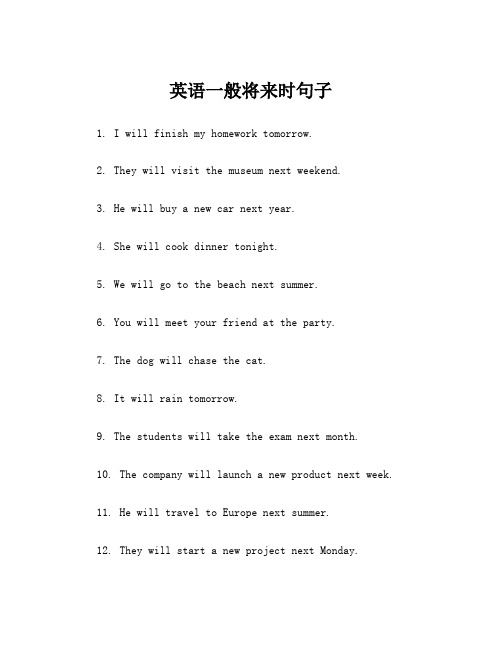
英语一般将来时句子1. I will finish my homework tomorrow.2. They will visit the museum next weekend.3. He will buy a new car next year.4. She will cook dinner tonight.5. We will go to the beach next summer.6. You will meet your friend at the party.7. The dog will chase the cat.8. It will rain tomorrow.9. The students will take the exam next month.10. The company will launch a new product next week.11. He will travel to Europe next summer.12. They will start a new project next Monday.13. She will give a presentation at the conference.14. We will have a picnic next Sunday.15. You will see the doctor tomorrow.16. The team will win the game.17. It will be sunny next weekend.18. The flowers will bloom in the spring.19. He will study for the test.20. She will graduate from college next year.21. They will finish the construction project next month.22. We will celebrate our anniversary next week.23. You will take a vacation next month.24. The concert will start at 8 pm.25. It will snow in the mountains.26. The company will open a new branch in the city.27. The baby will learn to walk soon.28. He will start a new job next week.29. She will plant a garden in the backyard.30. We will attend the wedding next weekend.31. You will visit your grandparents next month.32. The children will start school in the fall.33. The team will compete in the tournament.34. It will be hot in the summer.35. The building will be completed by the end of the year.36. He will join the gym next month.37. She will bake a cake for the party.38. They will adopt a new pet next year.39. We will go on a trip next summer.40. You will learn a new language.41. The company will expand its business.42. The movie will be released next month.43. It will take time to finish the project.44. The students will graduate in the spring.45. She will start a new job next week.46. They will move to a new house next month.47. We will attend the concert next weekend.48. You will learn to play the piano.49. The flowers will bloom in the garden.50. He will run a marathon next year.51. The team will practice for the game.52. It will be a busy day tomorrow.53. The company will introduce a new product.。
一般将来时小学ppt课件
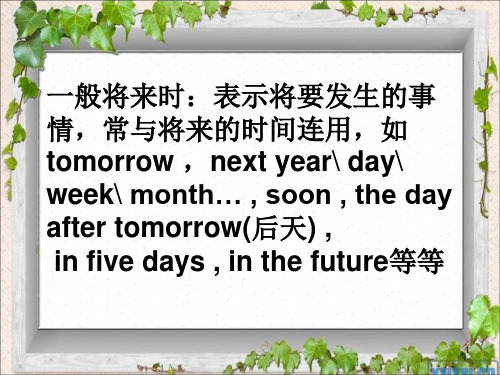
肯定句 :主语 + be ( am, is, are ) + going to + 动词原形 +其他.
I’m going to go there next month. 下个月我将去那里。 He is going to visit his grandparents next year. 明年他将要去看望他的爷爷奶奶。 They are going to find a new house to live in. 他们将要找一所新房子住。
7
三、用现在进行时表示。 经营者提供商品或者服务有欺诈行为的,应当按照消费者的要求增加赔偿其受到的损失,增加赔偿的金额为消费者购买商品的价款或接受服务的费用 表示位置转移的动词(如:go, come, leave, start, arrive等), 可用现在进行时表示将来时。如:
1. Uncle Wang is coming. 王叔叔就要来了。 2. They're leaving for Beijing. 他们即将前往北京。
否定句 : 主语 + be ( am, is, are ) + not + going to + 动词原形 +其他.
He isn’t going to see the movie. 他不会去看电影。 You aren’t going to work on the farm this weekend. 这个周末你们不去家场劳动。 We aren’t going to have a meeting this afternoon. 今天下午我们不开会。
一般疑问句:Will + 主语+动词原形+其他?
小学语法一般将来时课件

一般将来时的基本构成
01
02
03
04
基本结构
主语 + will + 动词原形
肯定句
主语 + will + 动词原形 + 其 他
否定句
主语 + will not + 动词原形 + 其他
一般疑问句
Will + 主语 + 动词原形 + 其 他
常用的一般将来时态句型
主语 + be going to + 动词原 形 + 其他
成绩等。
05
CATALOGUE
小学语法一般将来时的注意事项
需要注意的常见错误
误用“将来时态”的概念
有些学生会误认为“将来时态”就是表示未来的动作或状 态,而实际上它通常表示的是动作或状态在未来的计划或 预测。
忽略助动词的用法
在一般将来时的句子中,助动词“will”或“shall”是非 常重要的,它们表示动作或状态的可能性或意图。学生常 常会忽略助动词的用法。
使用助动词“will”或“shall”。
03
时间状语不同
一般现在时常与时间状语如“always”、“often”、“every day”
等连用,而一般将来时常与时间状语如“tomorrow”、“next
week”、“in the future”等连用。
THANKS
感谢观看
04
CATALOGUE
小学语法一般将来时的实际应用
在日常生活中的实际应用
01
02
03
预测天气
孩子们可以使用一般将来 时描述明天的天气情况, 例如:“明天将会下雨。 ”
日常计划
小学教学英语语法一般将来时

小学英语语法一般将来时1、定义:表示将要发生的动作或存有的状态,以及打算、方案或准备某事。
句中一般含有表示将来的时间状语,如:tomorrowmorning,nextweek,thisafternoon等表示将来的时间状语。
2、构成:①begongto+动词原形如:IamgoingtoseeaBeijingoperatomorrow.Wearegoingtomeetatbusstopathalfpastten.DadandIaregoingtoseeaBeijingoperathisafternoon.will+动词原形如:Theywillgoswimmingthisafternoon.3、begoingto 和will 区别:①begoingto表示经过事先安排、打算或决定要做的事情,根本上一定会发生;will那么表示有可能去做,但不一定发生,也常表示说话人的临时决定。
如:Iamgoingtotakepartinapartythisevening.Theyarecleaningthelibrarynow.I ’llgoandjointhem.②begoingto表示近期或眼下就要发生的事情;will表示的将来时间那么较远一些。
如:Heisgoingtowritealettertomorrow.Iwillmeetheroneday.begoingto还能够用来表示有迹象说明某件事将要发生,常用于天气等自然现象。
如:Look!It’sgoingtorain.4、一般将来时句型转换:肯定句/否认句/一般疑问句及答复Sheisgoingtohaveapicnictomorrow./Sheisn ’tgoing tohaveapicnictomorrow./ —Isshegoingtohaveapicnic tomorrow?—Yes,sheis./No,sheisn ’t.Theywillgoswimmingthisafternoon./Theywillnot(won’t)goswimmingthisafternoon./—Willtheygoswimmingthisafternoon? —Yes,theywill./No,theywon’t.。
小学英语语法之一般将来时
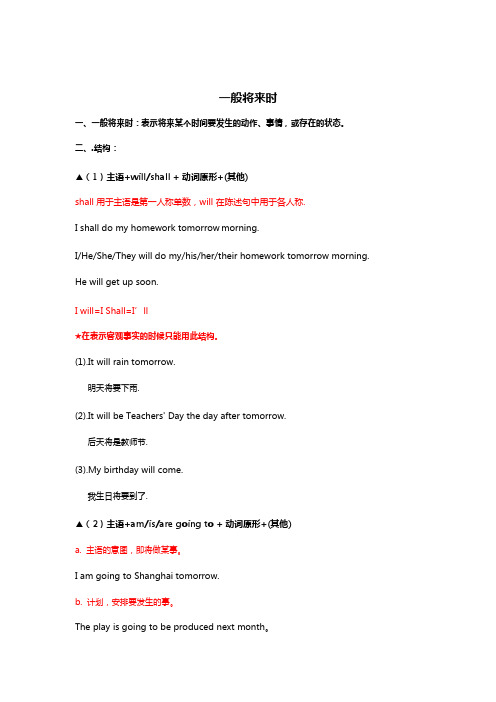
一般将来时一、一般将来时:表示将来某个时间要发生的动作、事情,或存在的状态。
二、.结构:▲(1)主语+will/shall + 动词原形+(其他)shall 用于主语是第一人称单数,will 在陈述句中用于各人称.I shall do my homework tomorrow morning.I/He/She/They will do my/his/her/their homework tomorrow morning. He will get up soon.I will=I Shall=I’ll★在表示客观事实的时候只能用此结构。
(1).It will rain tomorrow.明天将要下雨.(2).It will be Teachers' Day the day after tomorrow.后天将是教师节.(3).My birthday will come.我生日将要到了.▲(2)主语+am/is/are going to + 动词原形+(其他)a.主语的意图,即将做某事。
I am going to Shanghai tomorrow.b.计划,安排要发生的事。
The play is going to be produced next month。
c.有迹象要发生的事。
Look at the dark clouds, there is going to be a storm.(3)主语+be +to+动词原形+(其他),表示按计划要发生的事或征求对方意见。
We are to discuss the report next S aturday.(4)主语+am/is/are about to +动词原形,意为马上做某事。
He is about to leave for Beijing.(5)主语+be+v-ing,表示将来,表示按计划即将发生的动作,这类动词有 go, come,start,move,sail,leave,arrive,stay,live,fly。
(完整版)小学英语一般将来时
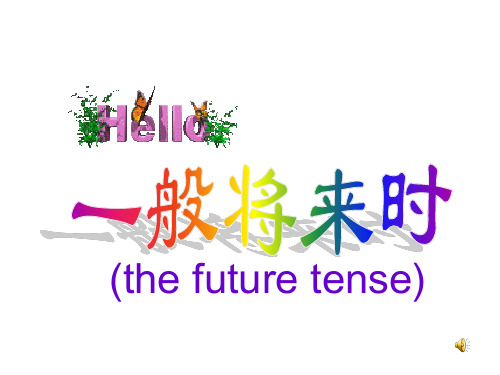
(the future tense)
•I’ m going to buy a book. •I’ m going to bake a cake. •I’ m going to walk near a lake. •We’ re going to take a trip. •I’ m going outside to play. •I’ m going to have a good day.
主语+ be going to+ 动词原形+ (宾语)+ 时间状语
主语+be going to+动词原形+(宾语)+时间
翻译下列句子: 1.明天我要去英国。
I am going to go to the UK tomorrow.
2. 明天他要做家务。 He is going to do the housework tomorrow.
一、单项选择。
(c ) 1. There __________ a meeting tomorrow
afternoon.
A. will be going to
B. will going to be
C. is going to be
D. will go to be
(D) 2. Lily ________ here next month.
句式转换:
He will play basketball tomorrow.
否定句:He wwiollnn’tot play basketball tomorrow.
小学英语一般将来时
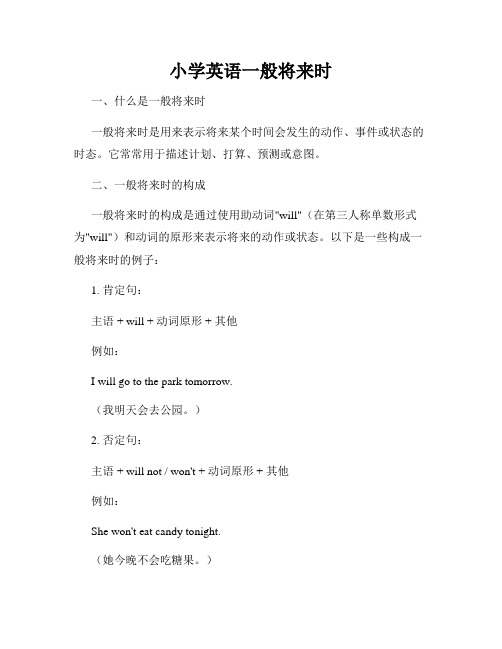
小学英语一般将来时一、什么是一般将来时一般将来时是用来表示将来某个时间会发生的动作、事件或状态的时态。
它常常用于描述计划、打算、预测或意图。
二、一般将来时的构成一般将来时的构成是通过使用助动词"will"(在第三人称单数形式为"will")和动词的原形来表示将来的动作或状态。
以下是一些构成一般将来时的例子:1. 肯定句:主语 + will + 动词原形 + 其他例如:I will go to the park tomorrow.(我明天会去公园。
)2. 否定句:主语 + will not / won't + 动词原形 + 其他例如:She won't eat candy tonight.(她今晚不会吃糖果。
)3. 疑问句:Will + 主语 + 动词原形 + 其他?例如:Will they come to the party?(他们会来参加派对吗?)三、一般将来时的使用场景下面是一些小学英语中常见的使用一般将来时的场景:1. 表示计划或打算:I will visit my grandparents next month.(我下个月会去拜访我的祖父母。
)2. 表示预测或推测:It will rain tomorrow.(明天会下雨。
)3. 表示意愿或承诺:I will help you with your homework.(我会帮你做作业。
)4. 表示未来常态:The school will start at 8:00 AM tomorrow.(明天学校将会在早上8点开始。
)5. 表示请求、命令或建议:Will you please pass me the book?(你能给我递一下那本书吗?)四、注意事项1. "will"后面的动词使用原形形式。
2. 助动词"will"可以缩写成"’ll"。
- 1、下载文档前请自行甄别文档内容的完整性,平台不提供额外的编辑、内容补充、找答案等附加服务。
- 2、"仅部分预览"的文档,不可在线预览部分如存在完整性等问题,可反馈申请退款(可完整预览的文档不适用该条件!)。
- 3、如文档侵犯您的权益,请联系客服反馈,我们会尽快为您处理(人工客服工作时间:9:00-18:30)。
一般将来时
一般疑问句
Shall we go to the park? Ok, let’s go. Shall I…?/Shall we…?的句型通常用来征
求对方的意见。
一般将来时
1、am/is/are going to + 动词原形: A.表示打算或准备要做的事情; B.也可以表示主观判断即将要发生的事情; C.还可以表示安排或计划中的动作。
2、主语+will+动词原形 +…
一般将来时
肯定句
主语+be(am/is/are ) going to+动词原形+… They are going to have a trip. He is going to make a plane model. I am going to get up early.
一般将来时
一般将来时
一般将来时
一般将来时
name
John Sissy Mary Bob
time
arrangement
go to America
go to the cinema buy a car
have a birthday party
一般将来时
ቤተ መጻሕፍቲ ባይዱ结构:
1、主语+be(am/is/are ) going to+动词原形+…
It’s going to rain soon. We are not going to see a film together.
一般将来时
2、用will构成的将来时,所表示的动作 与人的主观愿望无关。
I will graduate from this school soon.
You will stay alone after I leave.
一般将来时
否定句 主语+be(am/is/are ) not going to+动词原形+…
She isn’t going to see a movie.
I am not going to watch TV.
一般将来时
一般疑问句 Be(Am/Is/Are )+主语+going to+动词原形+…? Are your brothers going to play the computer? Yes, they are. / No, they aren’t.
一般将来时
3、shall和will在口语的一些疑问句中 相当于情态动词。Shall一般与第一人称 连用,will多与第二人称连用。
Shall we go to the zoo next Saturday?
Will you please open the box for me?
